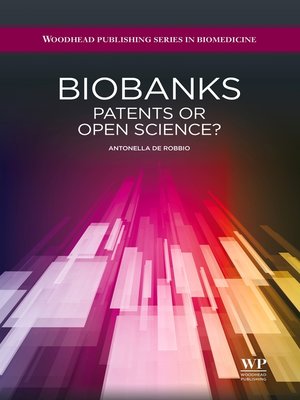Biobanks
ebook ∣ Patents Or Open Science? · Woodhead Publishing Series in Biomedicine
By Antonella De Robbio

Sign up to save your library
With an OverDrive account, you can save your favorite libraries for at-a-glance information about availability. Find out more about OverDrive accounts.
Find this title in Libby, the library reading app by OverDrive.



Search for a digital library with this title
Title found at these libraries:
| Library Name | Distance |
|---|---|
| Loading... |
Biobanks represent an invaluable research tool and, as a result of their intrinsic and extrinsic nature, may be looked upon as archives or repositories largely made up of libraries, or collections of content where the content is the biological material derived from different individuals or species, representing valuable tangible assets. Biobanks analyses aspects of the commons and common intellectual property relating to the concepts of private property, not only concerning data but biological materials as well, and the advantages and disadvantages of patents in scientific research. Several recent initiatives in biomedical research have attempted to make their data freely available to others, so as to foster innovation. Many of these initiatives have adopted the open source model, which has gained widespread recognition in the computer industry. This title is structured into eight chapters and begins with an introduction, which is followed by chapters that discuss how the term 'biobank' came about in scientific literature; legal matters relating to biobanks; and intellectual and physical property. Later chapters comprehensively analyse the intellectual property of biobanks within the sphere of copyright; biotechnological inventions and research patentability; open data sharing in biobanks; and biobanks as commons or vault.
- Considers biobanks as both repositories and as collections of tangible assets
- Argues that the data in biobanks represents a high value intangible asset
- Explores regulatory gaps exploited by the private sector







